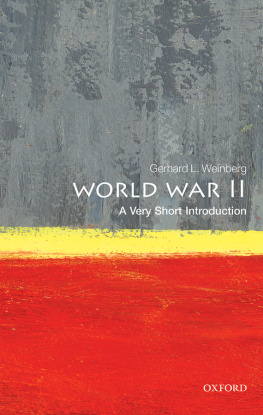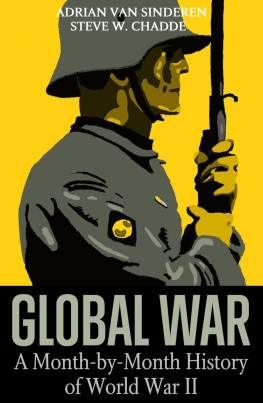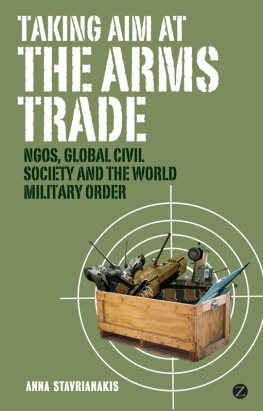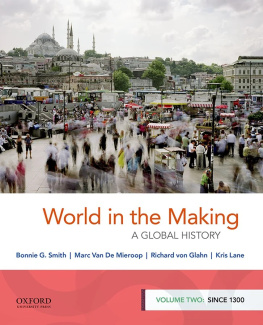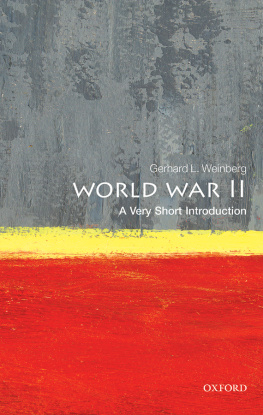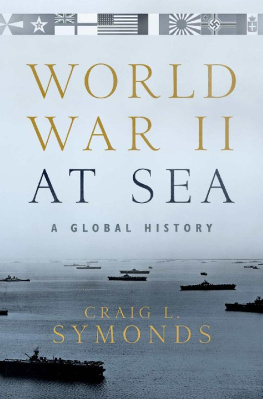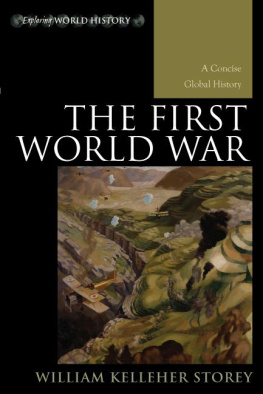WORLDWIDE PRAISE for A World at Arms
United States
... the prose is clear, the detail arresting and the arguments carefully deployed ... This is a tour de force, classical diplomatic history at its best. Mr. Weinbergs global view of the war pays dividends again and again.
David Reynolds, The New York Times Book Review Mr. Weinberg has provided a masterful study that captures the global sweep, carnage and ultimate triumph of this war. It is a book to read, ponder and then reread. Quite simply, A World at Arms had now taken its place as the onevolume history of the Second World War.
Calvin L. Christman, Dallas Morning News
This brilliant and exhaustively researched masterwork is simply the best book to date on World War II.
Detroit Free Press
United Kingdom
Splendid and truly encyclopedic ... A vast public of many nationalities needs to know what happened to the world between 1939 and 1945. Intelligent, learned, methodical, patient and lucid, Mr. Weinbergs book may well stand for the next twenty years as the most important instrument available to serve this need.
The Economist
There can be no better book to turn to than this for an explanation of the whole war ... there seems to be nothing about which Gerhard Weinberg is not an expert ... the text is a masterpiece of clear, level-headed explanation, remarkably free of the sound of any axe-grinding.
The Sunday Telegraph
This is a monumental work incorporating the major secondary literature, of which there is now a huge amount, as well as original research. No doubt it will remain one of the standard reference works on the Second World War, a tribute to Gerhard Weinbergs industry and perseverance.
John A. S. Grenville, The Times Higher Education Supplement
Ireland
This work by a German refugee of the time is a refreshing and stimulating perspective from which to review the war as a whole.
Eoghan Corry, Irish Press
Germany
Fifty years after World War II, which decisively marked the face of this century, there is now a marvelous, allembracing complete account of it from a global perspective, which is without parallel. Weinberg always tries to grasp all aspects of the global conflict and to fit them into a comprehensive treatment. Whether dealing with the fighting on land, sea, or in the air, espionage or reconnaissance, psychological warfare or weapons systemswith each new invention often leading to a counter-weaponnothing is left out. Furthermore, he tries to assign the individual aspects their proper weight, an especially difficult undertaking. He has been successful in this over and over again.
Hans-Adolf Jacobsen, Das Parlament
Japan
... a global history of the war deserving the attention of serious scholars and amateur historians alike ... a well-researched clearly written book that will provide new insights to most readers.
Ken Belson, The Daily Yomiuri
Australia
Let it be said loud and clear. Any reader with the remotest interest in modern history needs to be alerted to the existence of this book. Weinbergs A World at Arms ... is an extraordinary achievement.
Trevor Wilson, The Sydney Review
Professor Weinberg has achieved probably the most succinct, yet all-embracing, account of World War II ... Not only has he achieved what he set out to accomplish, but he has done it in a manner both absorbing and eminently readable. It is one of the great war histories of the century.
Frank Cranson, Canberra Times
Sweden
This is a huge and highly educated history of World War II on all of its fronts.
Jan Sandstrom, Arvika


GERHARD L. WEINBERG

A WORLD AT ARMS

A GLOBAL HISTORY OF
WORLD WAR II
Second Edition

CAMBRIDGE UNIVERSITY PRESS
Cambridge, New York, Melbourne, Madrid, Cape Town, Singapore, So Paulo, Delhi, Dubai, Tokyo, Mexico City Cambridge University Press
32 Avenue of the Americas, New York, NY 10013-2473, USA www.cambridge.org
Information on this title: www.cambridge.org/9780521618267
Cambridge University Press 1994, 2005
This publication is in copyright. Subject to statutory exception and to the provisions of relevant collective licensing agreements, no reproduction of any part may take place without the written permission of Cambridge University Press.
First published 1994
Second edition first published 2005
Reprinted 2005, 2006, 2008, 2009, 2010
Printed in the United States of America A catalog record for this publication is available from the British Library.
Library of Congress Cataloging in Publication Data A world at arms : a global history of World War II 2nd ed. / Gerhard L. Weinberg.
p. cm.
Includes bibliographical references and index.
ISBN 0-521-85316-8ISBN 0-521-61826-6 (pb.) 1. World War, 19391945. I. Weinberg, Gerhard L.
D743 .W424 2005
ISBN 978-0-521-85316-3 Hardback
ISBN 978-0-52161826-7 Paperback
Cambridge University Press has no responsibility for the persistence or accuracy of URLs for external or thirdparty Internet Web sites referred to in this publication and does not guarantee that any content on such Web sites is, or will remain, accurate or appropriate.
FOR JANET
CONTENTS
MAPS
PREFACE TO THE NEW EDITION
In the decade since this book was published, kind readers have followed the request in the original Preface to send me corrections. I am most grateful to those who have taken the trouble to call to my attention errors that it has been possible to correct in subsequent printings. Reviewers of the book have been very kind to it. In the intervening decade, there have been important new materials made accessible to scholars and there has, in addition, been a continuous outpouring of scholarly works dealing with the greatest war of which we know. While there may be an opportunity to revise the book as a whole, in the meantime this is a good interval at which to point to some areas where either changes will be needed or new studies have reinforced the interpretation previously offered.
Certainly the original thesis that Germany deliberately initiated World War II on September 1, 1939, by a procedure that drew on Adolf Hitlers lesson of Munich, namely that he would not be cheated of war again as had happened in 1938, has been confirmed by the detailed examination of the immediate origins of the war.
The description of the German decision to attack the Soviet Union has been confirmed by the new materials that have surfaced from both German and Soviet archives as a result of the effort of some to convert the German invasion into a sort of preventive move designed to forestall a planned invasion When Hitler decided on July 31 that the fall of 1940 would not allow for enough time to prepare and carry through the invasion, but that preparations for an invasion in 1941 should start, the general staff was already working on that. If there had been any concern about a Soviet invasion, why the willingness to wait?
Next page

